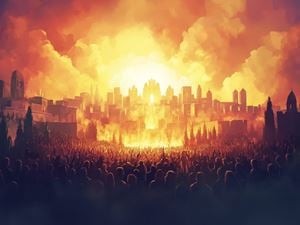
Knowledge of that which is ultimately “unknowable” cannot only intrigue, but it can also absolutely possess us. As humans, we feel anxious about what we do not know, and yet insanely curious about what we might be able to uncover. So much so, that there is a branch of theology known as eschatology—which refers to the doctrine surrounding the “end of times” or “last days.” For Christians, that branch of study often encompasses details about Christ’s second coming or the destruction of the wicked. For Jews, on the other hand, their eschatology might focus more on an expectation of an “ingathering” of God’s people to their “promised land,” or perhaps on some discussion of a yet-future resurrection of the dead.
Regardless of whether one is a Jew or a Christian, there seems to be some overlap in the belief that Israel will play a role in the divinely guided events of the “end times.” And while the various denominations of Judaism and Christianity don’t all agree on how certain biblical passages associated with the “last days” should be interpreted, most recognize that the people known as “Israel” will play a significant part in whatever lies ahead.
So, here are a few of the most intriguing predictions about what’s coming, and what role “Israel” will play in those.
The Gathering
One event repeatedly predicted in the Hebrew Bible—and which has never really been a point of contention between Christians and Jews—has to do with a future “gathering” of God’s “chosen” people. As an example, Daniel prophesied of the destruction of Jerusalem, but then said, “Jerusalem will be rebuilt” (Dan. 9:25). And YHWH declared to His “scattered” followers, “For I will take you out of the nations; I will gather you from all the countries and bring you back into your own land…Then you will live in the land I gave your ancestors; you will be my people, and I will be your God.” (NIV Ezek. 36:24, 28) This has universally been understood to suggest that, though Israel was scattered as a sort of divine punishment (e.g., Deut. 28:64; Jer. 9:16; Ezek. 22:15), God would eventually “cleanse” them “from all their impurities and from all their idols” (Ezek. 36:25), and then bring them back to the land He had originally promised would be their divine inheritance.
Numerous passages in the Bible speak of this eventual gathering. (E.g., Deut. 30:3; Ps. 107:3; Isa. 27:12, 51:11; Jer. 16:15-16, 31:10; Hos. 1:11; etc.) Many today—Jews and Christians alike—believe that the 1948 founding of the State of Israel was a beginning of the fulfillment of this prophecy. Indeed, a percentage of Jews today (particularly in the more theologically progressive traditions) have conjectured that the reestablishment of a Jewish state and/or the 1967 Six-Day War constitutes the “coming of the Jewish Messiah”—in that they have been brought “full circle” through their return to the “Holy Land” and, thus, are essentially “redeemed.” (While this is not a common interpretation among Orthodox Jews, those in progressive Jewish movements occasionally espouse it.)
A Time of Tribulation
We spoke above about Daniel’s prophecy that “Jerusalem would be rebuilt.” There is another rather famous passage (in that same chapter) where the Prophet speaks of some coming “abomination” which would leave YHWH’s “house” (or Temple) “desolate.” Daniel’s apocalyptic warning suggests that this corrupting evil had yet to be fulfilled in his day, but it is unclear (based on his prophecy) exactly when this “desolating abomination” would take place.
The salient verses of Daniel’s prediction reads: “This king will make a seven-year treaty with the people, but after half that time, he will break his pledge and stop the Jews from all their sacrifices and their offerings; then, as a climax to all his terrible deeds, the Enemy shall utterly defile the sanctuary of God. But in God’s time and plan, his judgment will be poured out upon this Evil One.” (NLT Daniel 9:27) This passage is interpreted variously.
However, for Jewish commentators, it is commonly tied to the destruction of Solomon’s Temple by the Babylonians in 587-586 BCE. Thus, for Jewish exegetes, though Daniel was being prophetic in what he said, this is not perceived as an “end time” prophecy. Its fulfillment was more than 2,000 years ago (in the minds of many Jews).
Similarly, a fairly mainstream scholarly view also places the events predicted in this verse in an ancient and non-eschatological setting. Many academics believe this passage has been referenced as the defilement of the Jewish temple under Antiochus IV (167 BCE), who was king of Syria. His corruption of the Zerubbabel’s Temple led to the famous Maccabean Revolt (which is at the heart of the Jewish holiday of Hanukkah). Christian commentators, on the other hand—drawing on Jesus’ mention of the “abomination of desolation” in the Gospels (e.g., Matt. 24:15; Mk. 13:14)—have regularly interpreted the prophecy in Daniel 9 as a prediction of Rome’s destruction of Herod’s Temple (in 70 CE). Again, this places the fulfillment of Daniel’s prophecy some 2,000 years ago, which would not make it an “end time” prophecy.
All that said, Daniel himself indicated that he was not sure what this vision of the coming “abomination” meant or when it would be fulfilled. (Dan. 12:8) Thus, the 7th-6th centuries BCE prophet inquired of God as to the interpretation of these events, but was told, “Go now, Daniel, for what I have said is not to be understood until the time of the end. Many shall be purified by great trials and persecutions.
But the wicked shall continue in their wickedness, and none of them will understand. Only those who are willing to learn will know what it means.” (TLB 12:9-10) Some have taken the words “time of the end” to mean the “end of times” (rather than simply ‘the time when this happens’). Accordingly, there are those who believe Daniel’s apocalyptic prediction foretells a yet-future “abomination”—one to be performed by the coming “antichrist” (See 1 John 2 & 4, 2 John 1, Revelation 13). For those who interpret the verse in this way, the “desolating abomination” of YHWH’s “house” is not about the corruption or destruction of one of the Jewish Temples but, instead, a post-biblical “abomination” impacting God’s covenant people (or “Israel”) and their ability to worship as God requires, and His ultimate vindication of them through His “judgements” to be poured out upon the “evil one.”
While most are not convinced that Daniel 9:7 is a true eschatological prophecy, nonetheless, if Daniel’s prediction can be placed in an “end times” setting (as 12:9 has occasionally been interpreted to mean), then the expectation is that great tribulation will come upon Israel (or the Jews) in the last days; though some Christian commentators interpret “Israel” here as a reference to “saved believers” who have accepted the “true” Messiah. Either of those eschatological interpretations lead to roughly the same conclusion: persecution, abominations, and limitations on religious freedoms will be placed upon “Israel” in the last days, leading up to the coming (or “second coming”) of the Messiah.
Animosity Toward Israel
Related to this previous prediction, the Book of Zechariah speaks of several eschatological events that might surprise those less versed in biblical prophecy. One of its “end times” predictions has to do with how the world will come to feel about “Israel” in the last days. In the 12th chapter (of this 6th century BCE prophecy) we are told: “I will make Jerusalem and Judah like a cup of poison to all the nearby nations that send their armies to surround Jerusalem. Jerusalem will be a heavy stone burdening the world. And though all the nations of the earth unite in an attempt to move her, they will all be crushed.” (NLT Zechariah 12:2-3) Similarly, in the Book of Revelation, it speaks of an army that will gather against Israel in the last days, and says it will be “A mighty host, numberless as sand along the shore” (NLT Rev. 20:8). Of that same battle, centuries earlier, Ezekiel prophesied that a host of nations would align themselves against Israel, including “troops” from Persia (modern-day Iran), Cush (Sudan or Ethiopia), Put (Libya), Gomer (modern Turkey), and Beth Togarmah (parts of Turkey and possibly Eastern Europe/Caucasus). (See Ezek. 38:5-6)
From the perspective of a Jewish commentator, this would most often be interpreted as an attack on the State of Israel by those various countries mentioned—and likely others. (In light of events in recent days, this seems altogether possible.) Some Christians likewise see this as a “sign of the times,” suggesting that when World War III breaks out in the “Holy Land,” then it will be known that Christ is about to return. Others see this bit of eschatology as dualistic, saying that Zechariah, Ezekiel, and John were seeing a time when the nation or people of the State of Israel would be involved in a massive war while, at the same time, believers (typically interpreted as Christian believers) would be under massive attack (by non-believers) for their views, doctrines, and even morality.
Regardless of how you interpret these passages, the general sense is that they predict a time in the last days when military might will be used against Israel.
And, at that same time, believers (whether those constitute Jews, Christians, or believers in God generally speaking) will be viciously attacked for their commitment to God and for their efforts at living in a way that ultimately offends the “non-believers.”
Recognition of the Messiah
An eschatological prediction highlighted by Christians, and rejected by mainstream Jews, has to do with the coming Messiah. As already mentioned, not all Jews agree on what the “Messiah” will be or in what form predictions about a future Messiah will be fulfilled. Christians, on the other hand, take a pretty hard stance on the idea that Jesus is the prophesied Messianic figure of the Hebrew Bible.
Through those lenses, Christians typically interpret two specific verses from the Book of Zechariah as being “Messianic prophecies”—or prophecies specifically foretelling some detail about the Messiah and His mission. (Though not everyone agrees on which passages are authentically messianic.) The first of these aforementioned passages states, “And one shall say unto him, ‘What are these wounds in thine hands?’ Then he shall answer, ‘Thus was I wounded in the house of my friends.’” (GNT Zech. 13:6) The second states, “the house of David and the inhabitants of Jerusalem…will look toward Me whom they pierced. They will mourn…as one mourns for an only son and grieve bitterly…as one grieves for a firstborn.” (TLV Zech. 12:10) From a premillennialist Christian perspective, these verses (and others like them) foretell a time when Jesus will appear to the people of Israel and they will learn that the Messiah of the Christians was also the Messiah of the Jews.
Inherent in common Christian interpretations of these words is the belief that Jesus will show the wounds of His crucifixion to His observers (as a means of proving who He is and what He has done for those who accept Him). Here, of course, His “observers” are understood to be members of the House of Israel. For some Christians, Zechariah’s prophecies are essentially what the Apostle Paul had in mind, when he wrote to the Saints at Rome: “And this is how all Israel will be saved. As the scripture says, ‘The Savior will come from Zion and remove all wickedness from the descendants of Jacob.’” (GNT Romans 11:26)
The Messiah Shall Reign
In some interpretations of “end time” prophecies, the Messiah will come (or, in Christian parlance, “return”) and reign from the “Holy Land.” As part of that Messianic Reign, Jerusalem will function as a sort of “HQ” for the Messiah and Israel will be restored to prominence once again. Accordingly, Isaiah visualizes Jerusalem as a future spiritual center for the word, stating, “and their people will say, ‘Let us go up the hill of the Lord, to the temple of Israel’s God. He will teach us what he wants us to do; we will walk in the paths he has chosen. For the Lord’s teaching comes from Jerusalem; from Zion he speaks to his people.’” (GNT Isa. 2:3)
Elsewhere, the Prophet Isaiah speaks of that Millennial Reign as being one that will bring peace to the entire world (Isa. 11:1-9) Ezekiel likewise sees, as part of that same “end time” scenario, a day when the “house of Israel” will again have a Temple in the land that once hosted Solomon’s Temple, Zerubbabel’s Temple, and Herod’s Temple. For the Prophet Ezekiel, this will be a time when the “glory” of God will return to that land and its people. (See Ezek. 40-47) The Complete Jewish Bible speaks about the beginning of the Messianic Reign in this way: “I saw the souls of those who had been beheaded for testifying about Yeshua and proclaiming the Word of God, also those who had not worshipped the beast or its image and had not received the mark on their foreheads and on their hands. They came to life and ruled with the Messiah for a thousand years. (The rest of the dead did not come to life until the thousand years were over.) This is the first resurrection.” (CJB Rev. 20:4-6)
Thus, both the Hebrew Bible and the Greek New Testament envision a time when Israel’s Messiah will reign upon the earth and the people of Israel—whether you interpret them to be the Jews or believing Christians—will receive both resurrection and also some sort of restoration to prominence because of their faithfulness to Him during their period of persecution.
Israel as Land, People, and Covenant
As should be evident, one of the challenges in interpreting these various passages (and what exactly they were intended to mean) is found in the fact that those who accept as inspired the various verses we’ve cited also have a variety of interpretations of what “Israel” means. The name-title was first given by God to Jacob, the grandson of the ancient biblical patriarch, Abraham. In Hebrew, Yisra'el means “God prevails.” And, thus, in the contexts on “end time” prophecies, it can suggest that when all is said and done, God will win the war over evil and over the enemies of His people.
While it is true that Jacob is the original “Israel,” scripture and Judeo-Christian theology and eschatology also use that term for Jacob’s descendants, for a specific parcel of land (located in the Middle East), for practitioners of Judaism, for those who are “in covenant” with God, and for Christians who see themselves as “modern Israel.” Thus, the same biblical passage will receive many interpretations, contingent upon one’s religion, denomination, and even eschatological framework.
On top of that, as we have already suggested, not all Jews today perceive the “Messiah” as the same thing, and not all perceive their place as “covenant Israel” in the same way. Likewise, while Christianity may be more united on who the Messiah is, they still have a variety of “interpretive frameworks” related to His coming, which cause them to interpret the same verse in various ways—creating quite a bit of disagreement and confusion on what exactly the role of “Israel” will be in the “last days.” Thus, to interpret an “end times” prophecy about “Israel” requires that you first discern what or who “Israel” actually is.
In Sum
Amid all the confusion about exactly how the various passages dealing with Israel and the end of times should be interpreted, what seems universally clear is that “Israel”—as a land, people, and body of believers—will play an important role.
If you are Jewish, that may mean that God’s “original” people will come full circle, return to their homeland, see the destruction of their enemies, and embrace their long-awaited Messiah. If you are a Christian, the fulfillment of these “end time” prophecies likely look more like Christ returning, wickedness being conquered, and many of the Jews embracing Jesus as the Savior.
Regardless of which interpretive lenses you wear, numerous biblical passages seem to suggest that in the last days, and as part of the “wrapping up scenes,” Israel will experience significant opposition as they gather to a location (and perhaps to a system of belief). They will participate in the building of a temple in the “Holy Land”—a temple that, if scripture can be taken literally, will affect a miraculous change in a previously barren land. Amid horrific challenges, they will receive strength, and ultimately recognize, receive, and live under the reign of their Messiah.
And, during a yet-future period of newfound peace, their former glory, which is actually His glory, will be poured down upon them—making them His people and His instruments in important parts of the Messiah’s 1,000-year millennial reign.
Read More:
Why Does It Seem Israel Is Always at War With Its Neighbors?Israel
6/24/2025 6:52:56 PM





